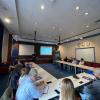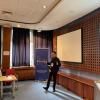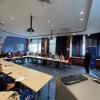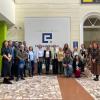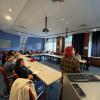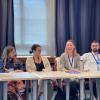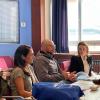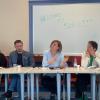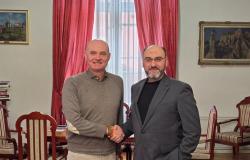Participants of the 10th international staff training week visited the UNSA School of Economics and Business

On the second day of the 10th staff week, the participants stayed at the School of Economics and Business of the University of Sarajevo. After the welcoming speech of the vice dean for international cooperation, prof. Ph.D. Emir Kurtić, and presentations about the Faculty and its achievements led by Assoc. Ph.D. Hatidža Jahić, a session on the challenges and problems encountered by Erasmus coordinators during the implementation of the Erasmus program called "Erasmus gone wrong" was opened. This session was led and presented by mr. sci. Adnan Rahimić, senior expert associate for international cooperation together with dr. Jasna Bošnović, head of the Department for International Relations Office at the University of Sarajevo.
After conducting research with 100 institutions across Europe, as well as a survey received by foreign participants of the Staff week, which was conducted by the International Relations Office of the UNSA, several of the most common challenges that coordinators face when implementing the program were singled out: (not) issuing invitations and transparency of selection, different forms of nomination and administration, impossibility of implementing "Erasmus without paper", problems with visa and student accommodation, language barriers that students face, drawing up study contracts for students, cross-cultural challenges and shocks experienced by students upon arrival in a new country and meeting them with a new culture, different interpretation of certain activities due to other laws (EU vs. non-EU), tuition fees and inflation, (non)recognition of achieved results for students and staff, the impact of world events on mobility (corona virus, wars, etc.) and other challenges we face every day. On each item, participants could give a comment or opinion or recount their experience with the same or similar events.
This was an ideal opportunity to exchange experiences and learn that we share the same and similar challenges, regardless of whether we are EU members or not. In this way, a network of experts was created through which information was exchanged. Examples of good practice were presented, which will help in further and joint work to improve the Erasmus+ program and adapt it to world changes, thus satisfying the academic and professional needs of students and staff - the ultimate participants of this program.





